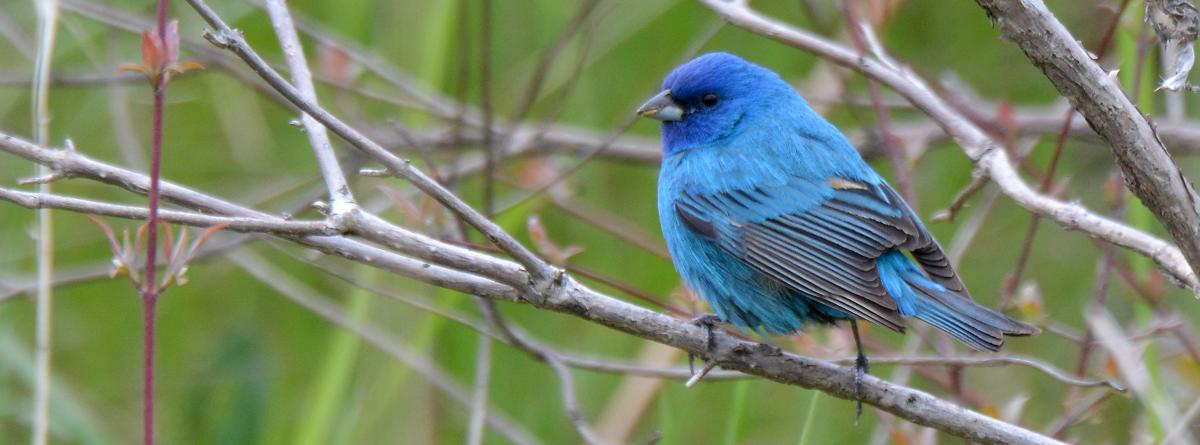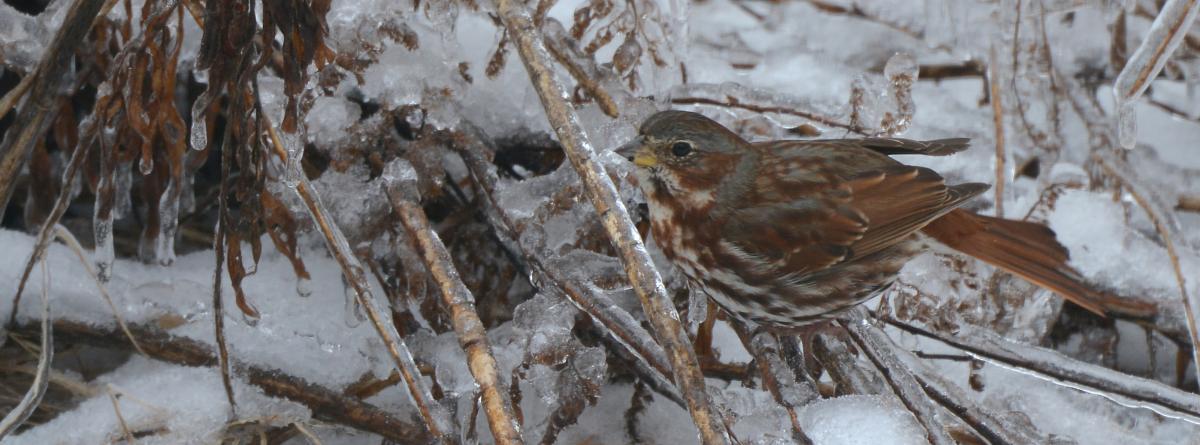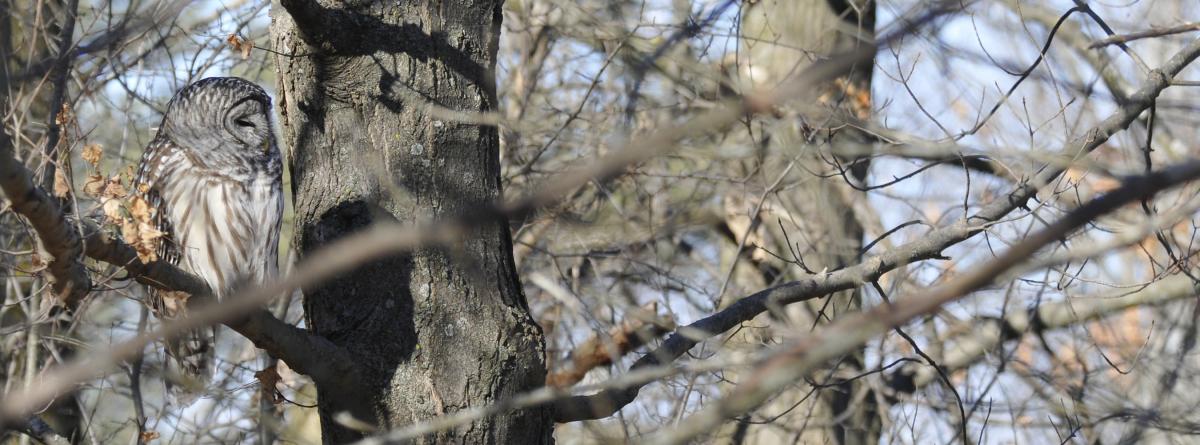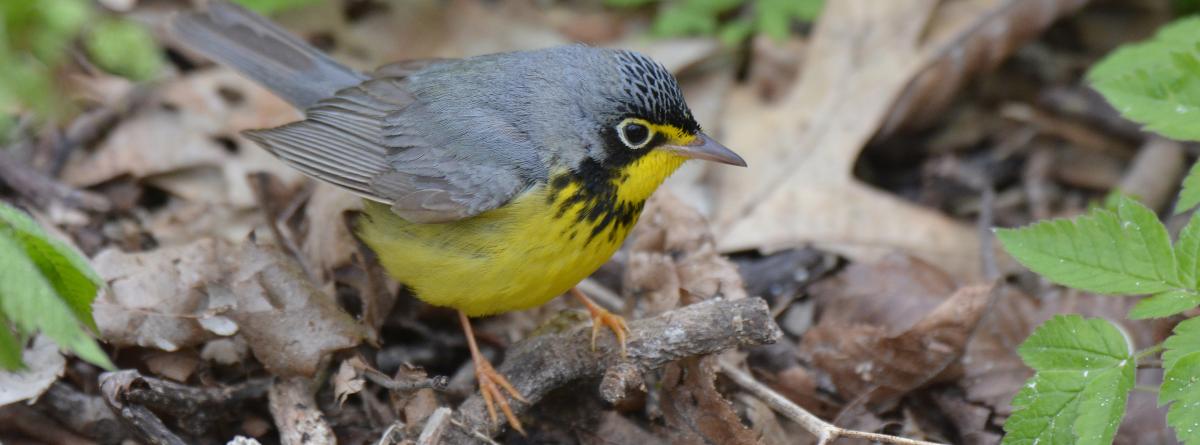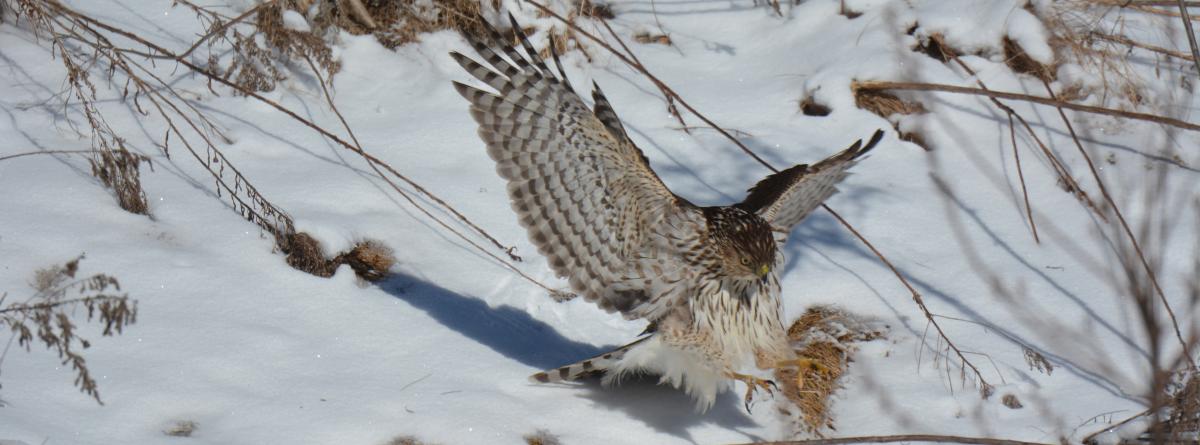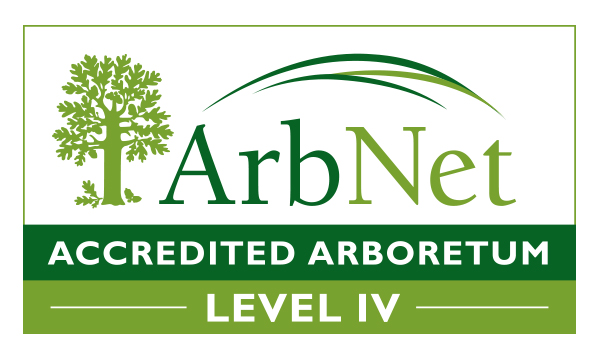Chris has been teaching various in-person bird workshops to thousands of nature enthusiasts since 1993. His virtual workshops started in 2020 and have very popular - over 1400 participants so far! And at only $70 per workshop, that's less than $10 per session.
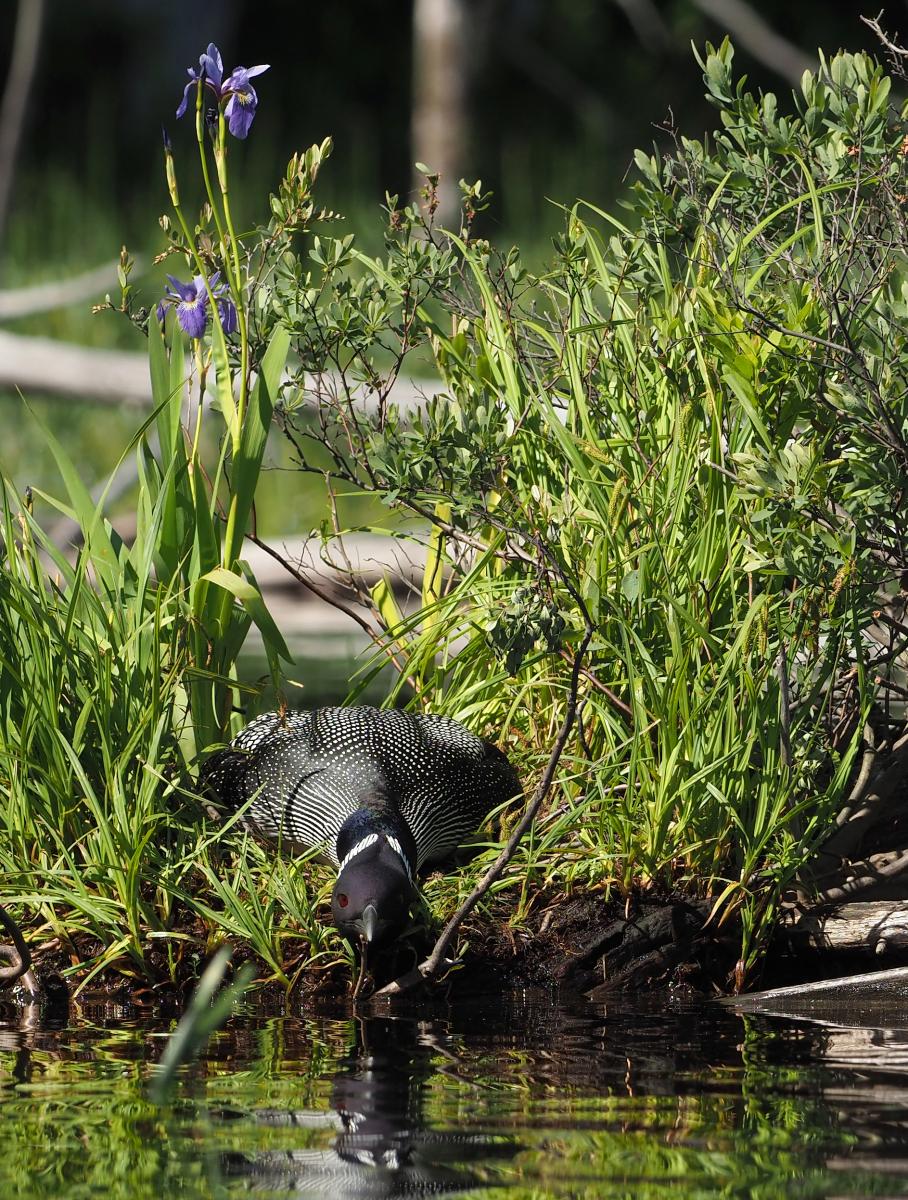
A successful loon nesting platform!
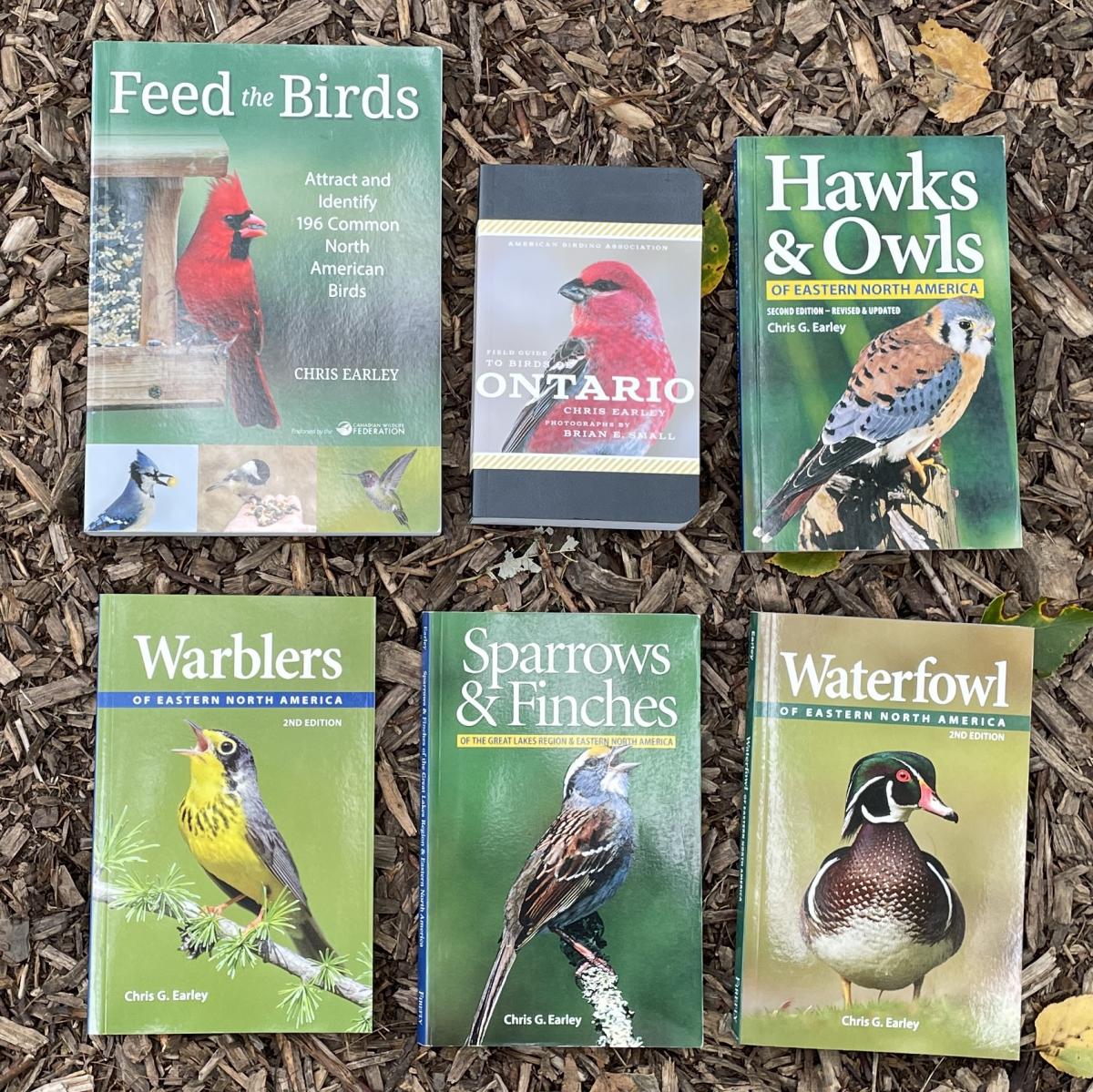
Chris Earley is the author of many bird books
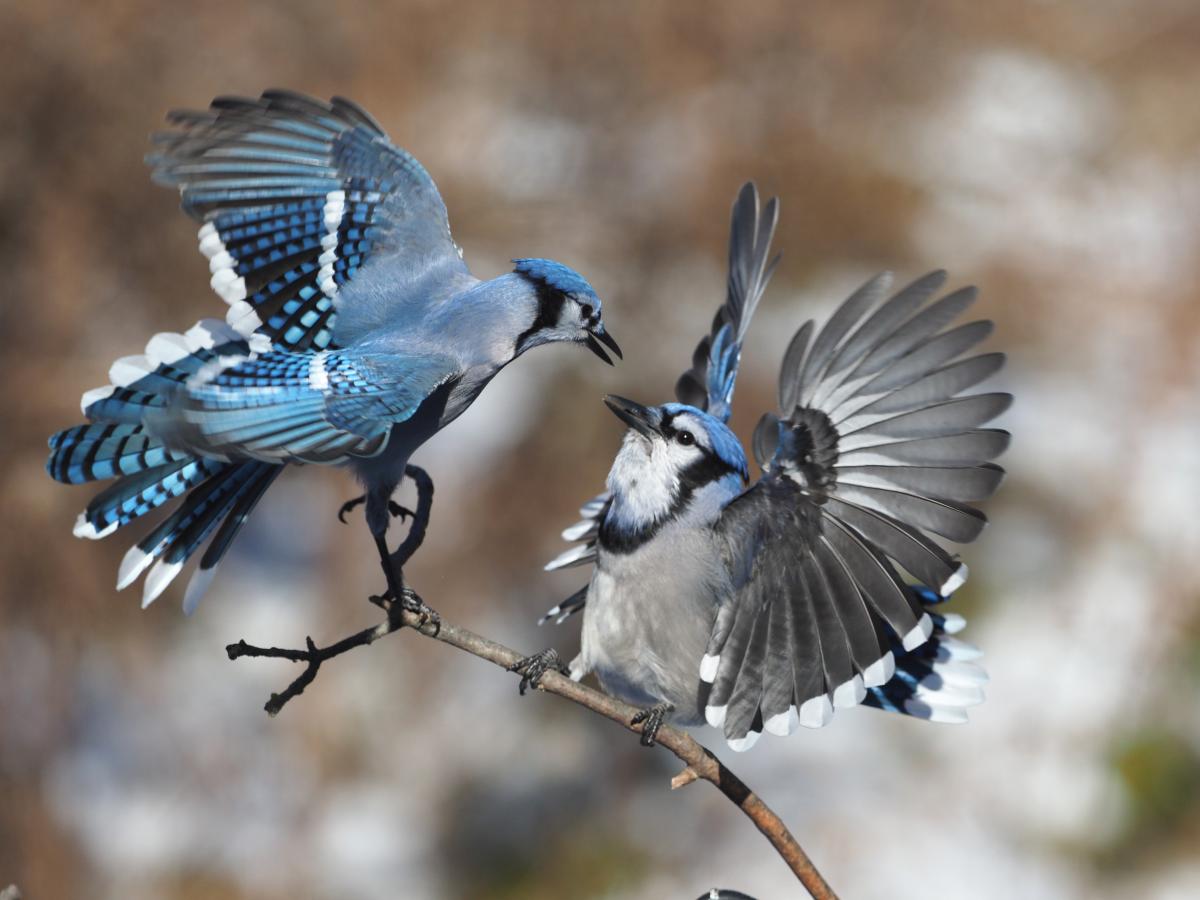
What are these Blue Jays squabbling about?
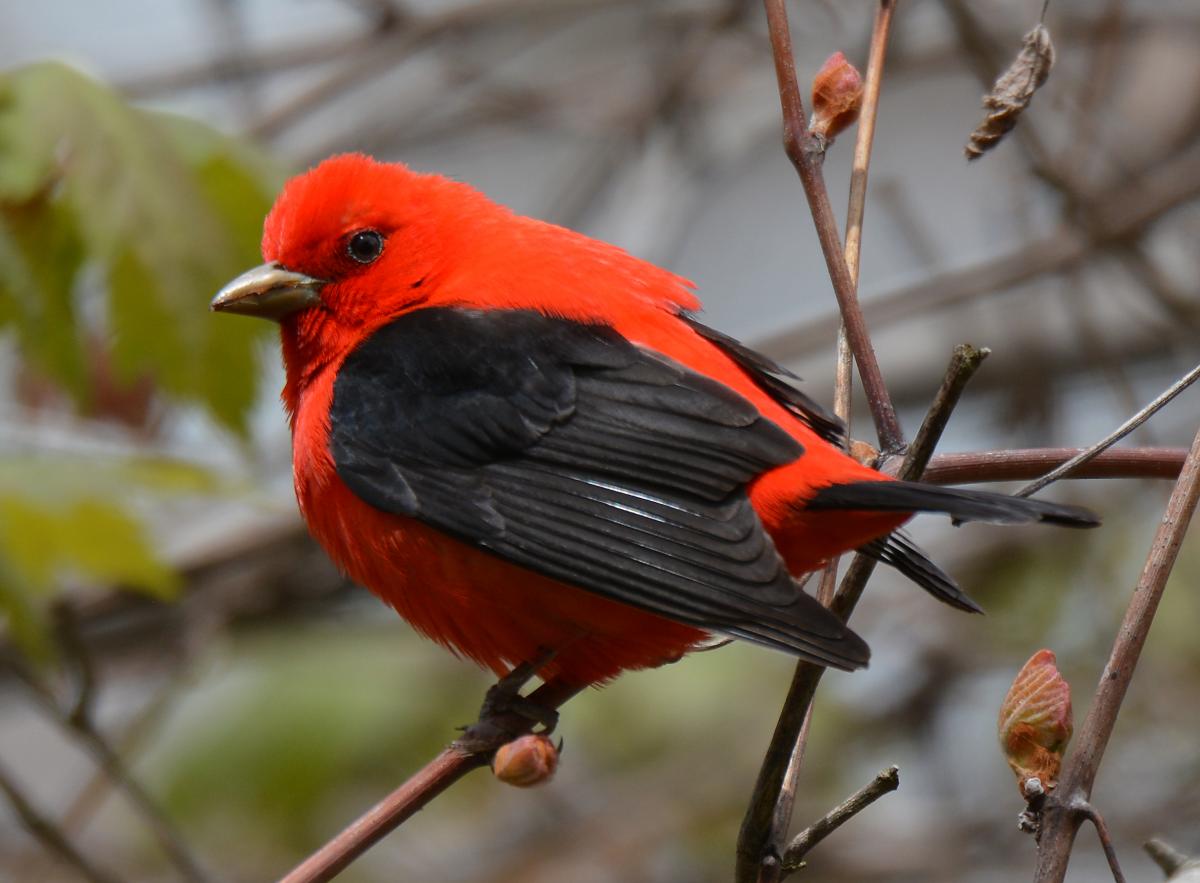
Is a Scarlet Tanager nesting near you?
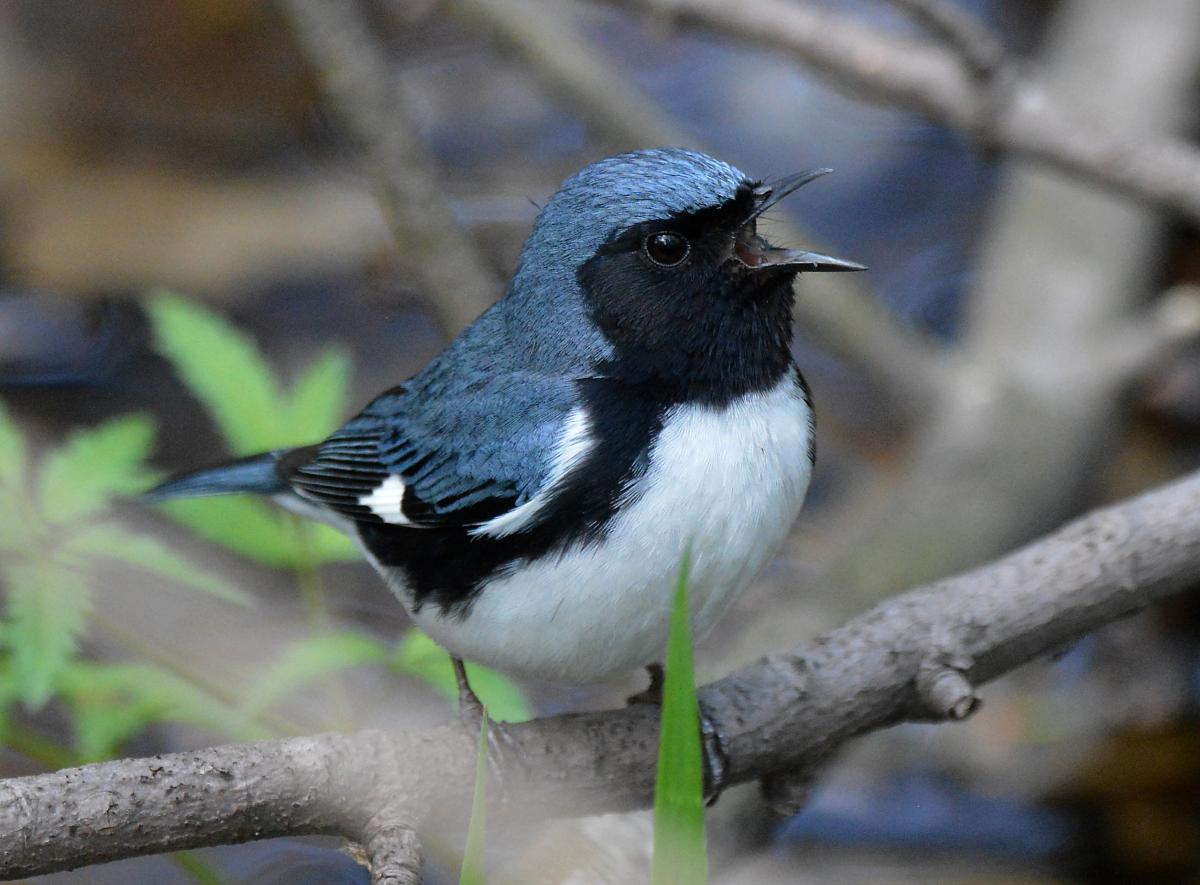
An easy way to remember the song of a Black-throated Blue Warbler is to think of it singing a buzzy "I am so lazy!"
All Photos were shot by our very own, Chris Earley [1].
Virtual Bird Sounds Series
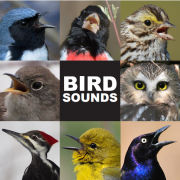
Mondays and Wednesdays, March 17, 19, 24, 26, 31, April 2, 7 and 9, 2025
12:00 Noon - 1:00 PM
Format: Online on Zoom
Instructor: Chris Earley, Arboretum Interpretive Biologist
Learn more about our Virtual Bird Song Programs
Into birding but the songs have you stumped? Whether you are new to learning bird sounds or you want a good refresher, this course is for you. Join Chris Earley, Arboretum Interpretive Biologist and author of 5 bird field guides, for a series of eight virtual noon-hour lectures that cover over 150 bird species! We will focus on songs and some common, distinctive calls and will apply different methods to remember them. Each course will start with a short intro topic about birding by ear before we dive into the bird species. Learn how to make your own calls, read a sonogram, make up your own memorable bird song sayings, and more! Each class will finish with a 10-15 minute discussion period so you can ask all your bird-related questions. See the descriptions below to find out which bird groups are covered in each class. All eight programs cost of $70 (plus tax) - that's less than $10 per program! This fund-raising initiative will help support other Arboretum educational programs.
Fee: $70.00 + H.S.T. This event will take place on Zoom. The list of topics with the presentation date is listed below. If you can't make it to any of the programs, each one is recorded and the recording will be sent to you the next day. The recordings will be available for one month after the last program.
 Owls and Wetland Birds - Day 1 - Monday, March 17, 12 noon – 1:00 PM
Owls and Wetland Birds - Day 1 - Monday, March 17, 12 noon – 1:00 PM
Whooooooo was that? Owls always grab our nightly attention but many wetland birds are also evening singers. We will cover a selection of rails, coots, bitterns, loons, grebes, and more. And don't forget a couple of glorious goatsuckers (whip-poor-wills and nighthawks)! This course will include teaching you how to speak "owl."
 Blackbirds and Hawks - Day 2 - Wednesday, March 19, 12 noon – 1:00 PM
Blackbirds and Hawks - Day 2 - Wednesday, March 19, 12 noon – 1:00 PM
These two groups include some early migrants and now is the time we get to see them after a long absence! We will cover the whole blackbird family including meadowlarks, bobolinks, and orioles. We will also study some raptor calls so you can figure out who might be flying through or maybe nesting in your local forest.
 Warblers I - Phrasers and Buzzers - Day 3 - Monday, March 24, 12 noon – 1:00 PM
Warblers I - Phrasers and Buzzers - Day 3 - Monday, March 24, 12 noon – 1:00 PM
Knowing warbler song is a key element for finding these tiny trinkets of the treetops. The males will even sing during migration so knowing their voices is important. In this course we will start with the species that sing distinctive phrases or use a buzzy texture in their songs.
 Warblers II - Trillers and Thrillers - Day 4 - Wednesday, March 26, 12 noon – 1:00 PM
Warblers II - Trillers and Thrillers - Day 4 - Wednesday, March 26, 12 noon – 1:00 PM
So, this time things might be a bit more, um, difficult. Trilling birds are tricky but we will go through them and study the differences in these similar songs. We will also cover some other warblers that are a bit more musical and easier to figure out!
 Sparrows - Day 5 - Monday, March 31, 12 noon – 1:00 PM
Sparrows - Day 5 - Monday, March 31, 12 noon – 1:00 PM
They may be a lot duller to look at than warblers but most sparrows are much better singers! Sometimes it is easier to tell them apart by song than by sight. We will study who says "Home Sweet, Canada, Canada, Canada", "I gotta go wee wee now!" and "Won't you come sit down besiiiiiide meeeee?"
 Finches and Thrushes - Day 6 - Wednesday, April 2, 12 noon – 1:00 PM
Finches and Thrushes - Day 6 - Wednesday, April 2, 12 noon – 1:00 PM
Finches, including grosbeaks, redpolls, and crossbills, can be sparrow-like but are even better songsters. But some of them sound the same so we will figure out ways to tell them apart. Their call notes can be important during bird surveys so we will cover some of them, too. Thrushes have lovely voices and one was once voted as the best singing bird in North America! Find out which one at this workshop.
 Woodpeckers and Flycatchers - Day 7 - Monday, April 7, 12 noon – 1:00 PM
Woodpeckers and Flycatchers - Day 7 - Monday, April 7, 12 noon – 1:00 PM
Sometimes you have to know mechanical sounds to figure out a nearby territorial bird - woodpecker drumming is a prime example. They also make some distinctive calls. And speaking of distinctive, some flycatchers can only really be identified by their songs, not by sight! We will listen to these and get a handle on this confusing group.
 Wrens and Friends - Day 8 - Monday, April 9, 12 noon – 1:00 PM
Wrens and Friends - Day 8 - Monday, April 9, 12 noon – 1:00 PM
We will finish off with a hodge podge of species such as wrens, vireos, jays, nuthatches, kinglets, and more! Many of these live in forest habitats and could all be singing or calling at the same time so learning to differentiate them is an important skill. Are you ready for the challenge?
Virtual Bird ID
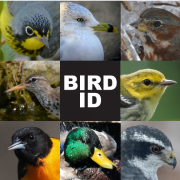
*Please check back at a later date for possible 2025 dates
Mondays and Wednesdays, November 4, 6, 11, 13, 18, 20, 25, and 27, 2024
12 Noon - 1 PM
Format: Online on zoom
Instructor: Chris Earley
Learn more about our Virtual Bird ID programs
Why not take your birding to the next level? Join Chris Earley, Arboretum Interpretive Biologist and author of 5 bird field guides, for a series of eight virtual noon-hour lectures on eight different bird groups. ID techniques, field marks, shapes, behaviour clues and more will all be covered. Each course will finish with a 10 - 15 minute discussion period so you can ask all your bird-related questions. All eight programs cost $70 (plus tax) - that's less than $10 per program! Bird groups covered include: Hawks, Ducks, Sparrows, Sandpipers, Gulls, Spring Warblers, Fall Warblers and Spring Migrants. This fund-raising initiative will help support other Arboretum educational programs. Fee: $70.00 + H.S.T. This event will take place on Zoom. The list of topics with the presentation date is listed below. If you can't make it to any of the programs, each one is recorded and the recording will be sent to you the next day. The recordings will be available for one month after the last program.
 Hawks - Monday, November 4, 12 NOON - 1:00 PM
Hawks - Monday, November 4, 12 NOON - 1:00 PM
Everyone loves raptors but they can be a bit challenging as they fly by overhead. We will be covering what to look for to ID our 16 regular species. A special emphasis will be learning how to tell Cooper's Hawks from Sharp-shinned Hawks as they are common backyard predators that can be confusing!
 Ducks - Wednesday, November 6, 12 NOON - 1:00 PM
Ducks - Wednesday, November 6, 12 NOON - 1:00 PM
This colourful group of waterfowl is full of interesting shapes, patterns and lifestyles. And, while the males are usually pretty straightforward to identify, the females can be quite challenging! We will dabble with dabblers and dive into divers in this web-footed workshop.
 Sparrows - Monday, November 11, 12 NOON - 1:00 PM
Sparrows - Monday, November 11, 12 NOON - 1:00 PM
"Uh oh, a sparrow!" If this statement has ever left your lips, then this talk is for you! They may seem drab and dull at first, but these LBJs (little brown jobs) really aren't that hard once you know what to look for. And since there are different species depending on the season, they are really worth knowing!
 Sandpipers - Wednesday, November 13, 12 NOON - 1:00 PM
Sandpipers - Wednesday, November 13, 12 NOON - 1:00 PM
There's nothing like looking at a bird that is standing right out in the open and still not being able to identify it. Sandpipers definitely fall into this category. We will cover beak and body shape, leg and neck length, colour placement and behaviour so you will have a better chance to id that shorebird the next time you see it.
 Gulls - Monday, November 18, 12 NOON - 1:00 PM
Gulls - Monday, November 18, 12 NOON - 1:00 PM
Did you know that southern Ontario (and specifically the Niagara River) is often considered the Gull Capital of the World? In late fall/early winter, we can find many species of gull in this region, so it is time to get to know our french fry-loving friends. We will focus on adults but also cover some immature stages to try and get a handle on this interesting group of birds.
 Spring Warblers - Wednesday, November 20, 12 NOON - 1:00 PM
Spring Warblers - Wednesday, November 20, 12 NOON - 1:00 PM
Mention the words "spring warblers" to birders in the depths of February and you'll see longing, wistful looks on their faces. That's because spring warblers rock! And southern Ontario in spring is an amazing place to see over 30 species of these colourful little rays of sunshine. But this abundance of species does mean a lot to remember, so we will be covering ways to help with that.
 Fall Warblers - Monday, November 25, 12 NOON - 1:00 PM
Fall Warblers - Monday, November 25, 12 NOON - 1:00 PM
While "spring warblers" will bring a smile to a birder's face, "fall warblers" might turn that smile upside down. This bird group is especially tricky during their fall migration when some species transform miraculously into seemingly different birds altogether! But don't worry, we will get them sorted out.
 Spring Migrants - Wednesday, November 27, 12 NOON - 1:00 PM
Spring Migrants - Wednesday, November 27, 12 NOON - 1:00 PM
This hodge podge of bird groups makes May migration a special time for nature lovers. We will cover some easy to id species (male Baltimore Oriole!) and some not-so-easy ones (ack, a little greenish flycatcher!) to help you be prepared for next spring.
Click below to select the bird id course(s) you want.
Virtual Cottage Birds Series
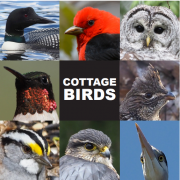
* Please check back at a later date for possible 2026 dates
Mondays and Wednesdays, January 20, 22, 27, 29, February 3, 5, 10, and 12, 2025
12 Noon - 1 PM
Format: Online on zoom
Instructor: Chris Earley
Learn more about our Cottage Birds Program
While sitting on the dock, have you ever asked "Did that loon just attack that duck?" or "How can that Pileated Woodpecker peck such big holes without hurting its brain?" or "Which hawk is that flying overhead?" The answers to these and many other bird-related questions will be covered in this series of eight one-hour sessions on the birds you notice while visiting a cottage, hiking in a northern park or tenting at your favourite campsite. We will cover identification clues, behaviour, nesting info, habitat, foraging techniques and more. Cottage projects and activities that help birds will also be a part of each session as well as a 10-15 minute discussion period for bird-related questions. All eight programs cost of $70 (plus tax) - that's less than $10 per program!
Fee: $70.00 + H.S.T. This event will take place on Zoom. The list of topics with the presentation date is listed below. If you can't make it to any of the programs, each one is recorded and the recording will be sent to you the next day. The recordings will be available for one month after the last program.
